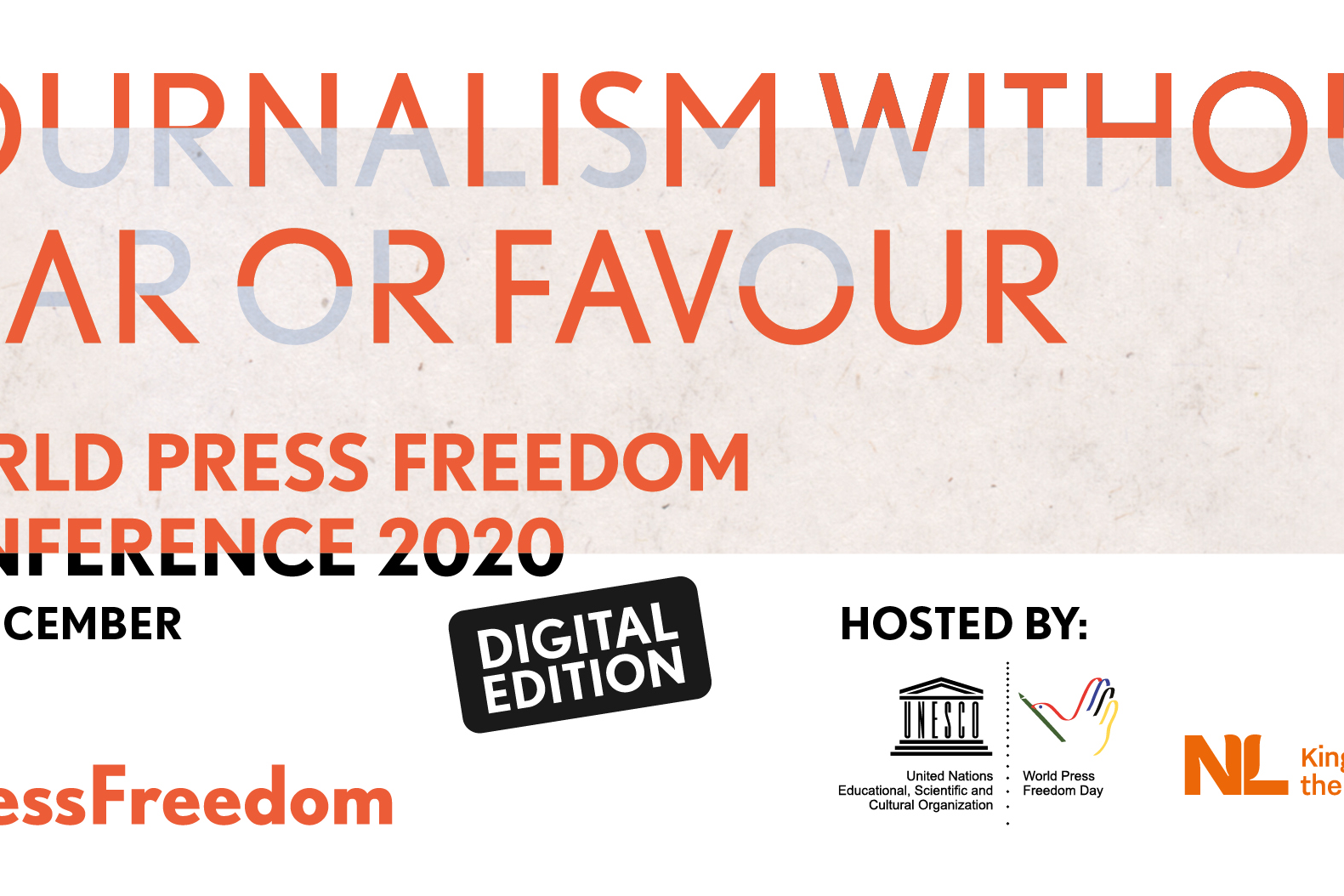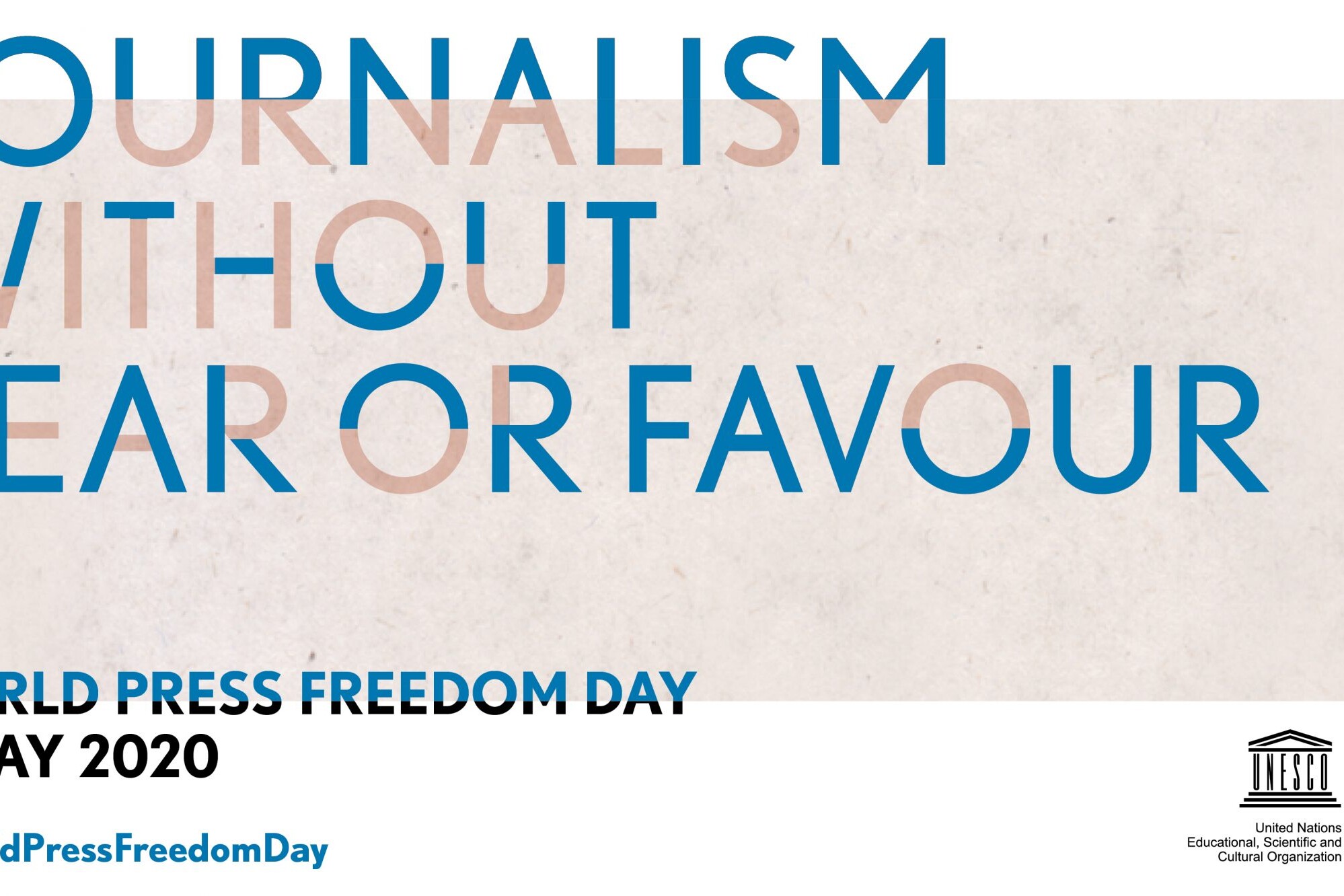Catch up with our session ‘Why Public Media Matters’ from this year’s virtual World Press Freedom Conference.
Public media is built around the core values of good journalism: independence, accountability, accuracy, impartiality, diversity, universality and transparency. Independent public service media (PSM) organisations have a critical role in underpinning informed democracy, and they remain among the most trusted media organisations. As Sally-Ann Wilson, CEO of the Public Media Alliance, shared in her opening remarks:
“Research, like this from [the] Reuters Institute for the Study of Journalism (RISJ), demonstrates that in countries where public media remains independent, these broadcasters are highly trusted by the public. Especially in times like these, with citizens everywhere facing a global pandemic. But public trust is a fragile thing. It takes years to make but just minutes to break.”
Now, public media are under threat worldwide.
“Today, there are growing challenges and threats to public media in just about every corner of the world. The biggest threat is to its independence. And it’s that editorial independence that allows the journalists working for these organisations to hold powerful people to account. Governments worldwide often acknowledge the threats to individual journalists. But the amount of freedom and independence that they grant their own broadcast networks is also central to the media freedom debate.”
From journalist safety and defamation, to struggles for editorial and financial independence, our session, Why Public Media Matters, discussed what public media is, how it can remain credible, trusted and viable in the digital age, and explored some of the significant press freedom challenges facing PSM worldwide.
“…public trust is a fragile thing. It takes years to make but just minutes to break.”
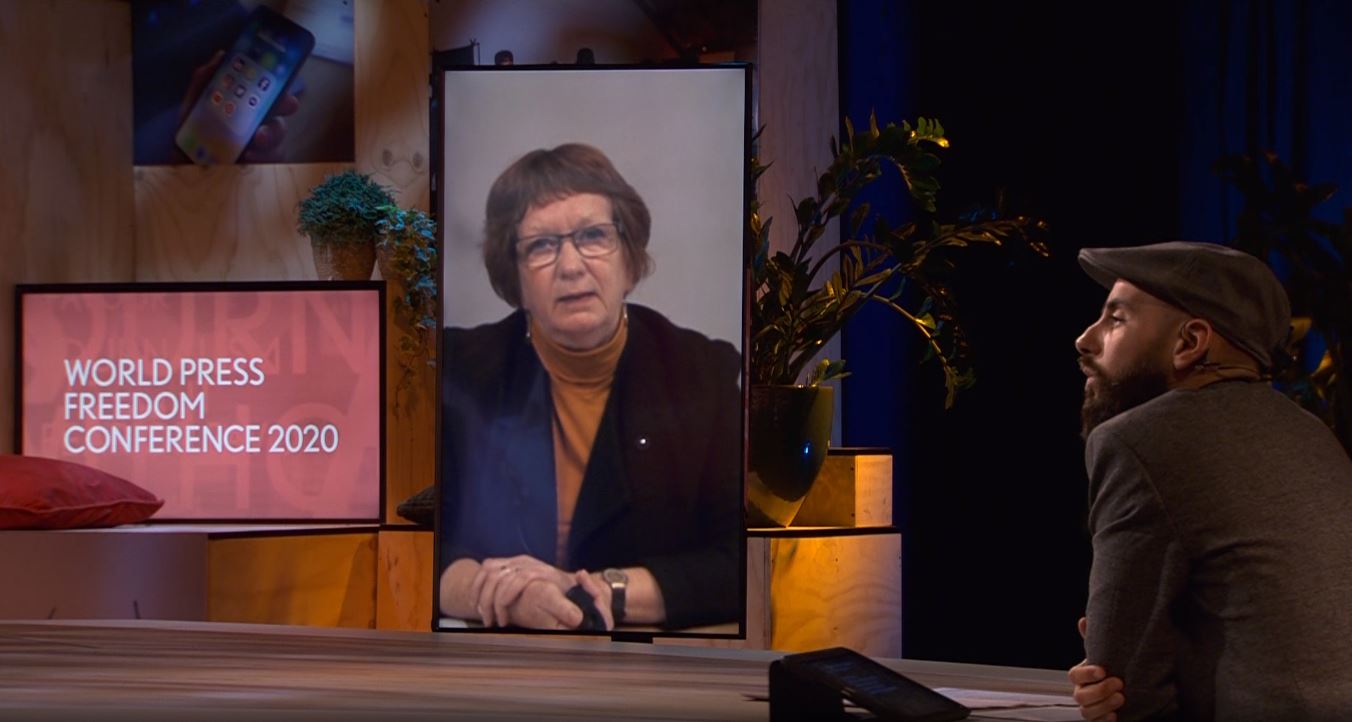
“Today, there are growing challenges and threats to public media in just about every corner of the world. The biggest threat is to its independence. And it’s that editorial independence that allows the journalists working for these organisations to hold powerful people to account.” – Sally-Ann Wilson, CEO, Public Media Alliance
Public media must be impartial and independent from political and financial pressures
Cilla Benkö, Director General of Swedish Radio stated that “Money should come directly from the people.” Referring to scientific research, which indicates that, where there is public media, citizens are often better educated and more informed, she said that citizens are therefore better equipped to contribute to society effectively. But at the same time, while reach and trust in public media remain high in Sweden, public broadcasters are still put at risk from political and financial pressures. This risk is increased by growing concerns about media markets becoming more polarised worldwide.
Read more: Impartial media is necessary to avoid parallel realities
Having historically begun as a state broadcaster (that is, an organ of the state), “we are [now] in a good position as a public broadcaster,” said Director General of the Ghana Broadcasting Corporation (GBC), Professor Amin Alhassan. However, public broadcasting is still viewed as a challenge by some politicians in Ghana. In addition, in recent years, the Ghanaian public broadcaster has experienced strong public opposition to paying for the licence fee. Professor Amin highlighted that, “We fail to let them understand that they are paying for the promotion of diversity of content… [and for] access to citizens wherever they are…The current challenge now is: how do we put in place a sustainable mechanism for funding public media in Ghana and in other African countries?”
Read more: Focus on PSM | Ghana
The Ghanaian public broadcaster also received a directive earlier this year by the Ministry of Communications to shut down half of its channels on the national Digital Terrestrial Television (DTT) platform. However, the order was later suspended after widespread criticism that called it out as “a form of undue interference in the Ghana Broadcasting Corporation.”
Read more: Directive to shutdown GBC channels suspended
“The current challenge now is: how do we put in place a sustainable mechanism for funding public media in Ghana and in other African countries?”
From left to right: Cilla Benkö, Director General of Swedish Radio, Professor Amin Alhassan, DG, GBC Ghana and Gaven Morris, Director News, Analysis and Investigations, ABC Australia
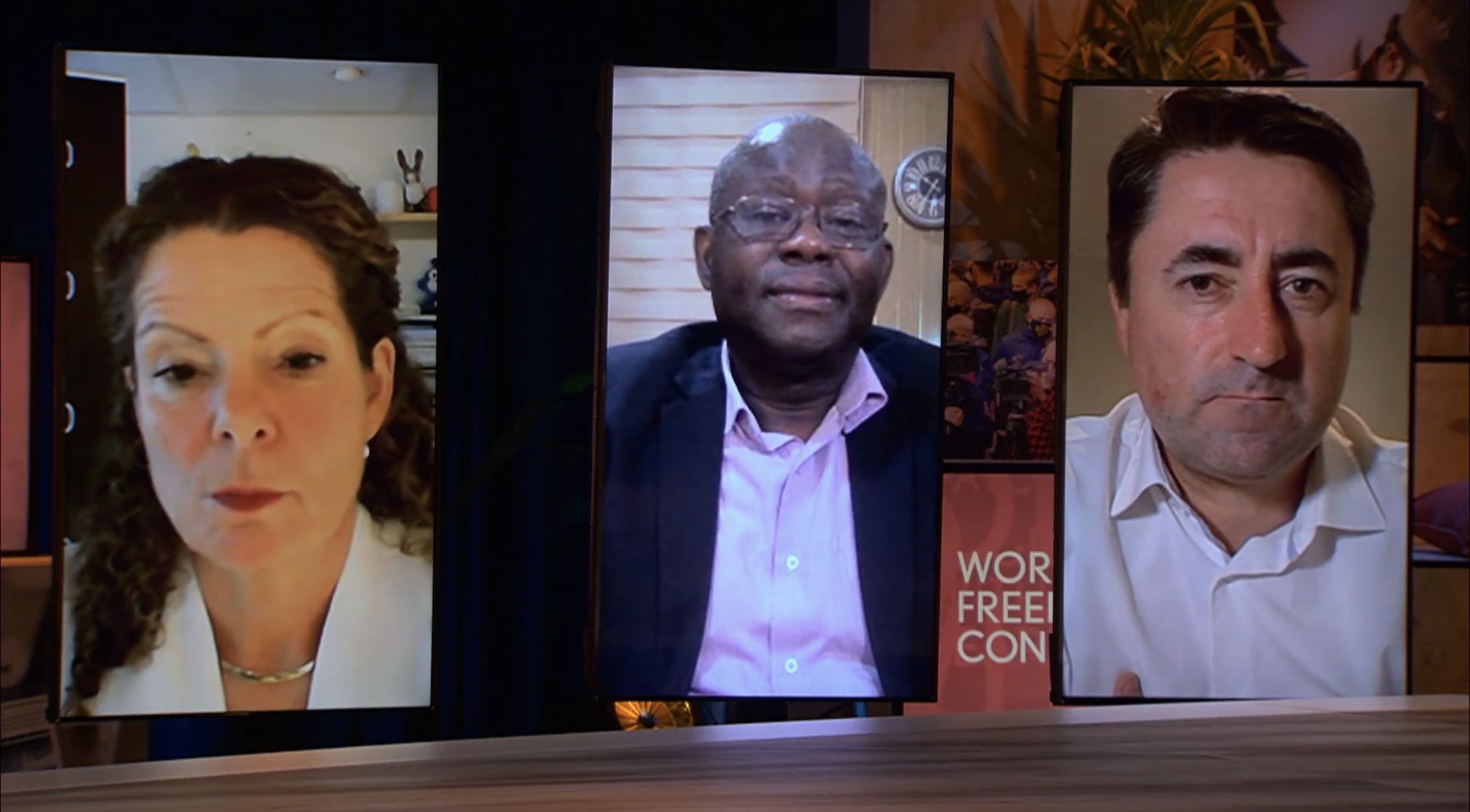
Public media is there for citizens through triumph and tragedy
“If ever there was a time to focus on public media, it was these past twelve months in Australia.” From rolling emergency broadcasts of the catastrophic bushfires and COVID-19 coverage to remote learning provisions, Gaven Morris, Director of News, Analysis and Investigations at the Australian Broadcasting Corporation (ABC) reminded us that “public media is a service for us all as members of the public.”
When asked about how we differentiate between state and public media, Gaven explained: “In different parts of the world… there are different views both from governments and from the public, around the role a public broadcaster plays. I come back to the fundamentals of what we do and I still think the truth wins…”
And in reference to the pressures on the ABC, Gaven added, “…do not let the whistleblowers hide in the shadows at a time when we need them more than ever. Help them bring their stories to the core. If the politicians and the authorities are afraid of what it is that we’re saying, we need to say it louder. I think that really is the essence of public broadcasting in any country, in any regime.”
“If the politicians and the authorities are afraid of what it is we’re saying, we need to say it louder. I think that really is the essence of public broadcasting in any country, in any regime.”
Read more: ABC’s coverage of the Australian bushfires
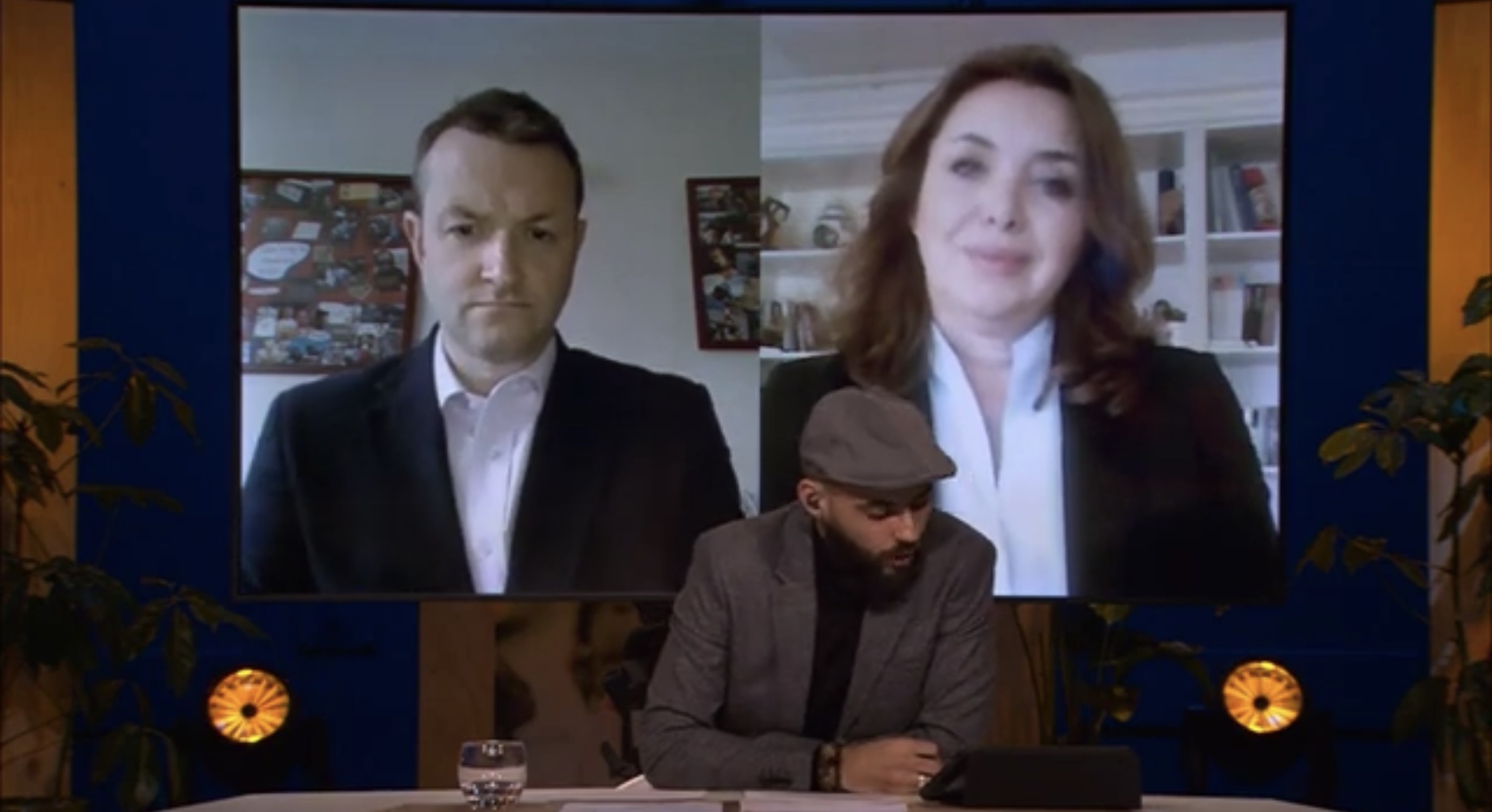
From left to right: Jamie Angus, Director, BBC World Service Group and Sanja Mikleusevic Pavic, Croatian Journalists’ Association
Media laws and insecure financing are the biggest threats to public media
“If you can criticise the work of politicians, for example, and other social groups, why should we not question the work of the public service leadership, especially in terms of [the] COVID pandemic, when we have to be maximally open and transparent?” questioned Sanja Mikleušević Pavić, a journalist with HRT and the Croatian Journalists’ Association who has received a SLAPP.
Read more: EU: A call for action to combat SLAPPs (Article 19)
Public media in Croatia is under pressure and it has been a long, incomplete process to transition the national broadcaster from state to public. She also described the situation in neighbouring Slovenia where, despite growing political pressures, Slovenian TV has maintained significant backing from the public. She emphasised that gaining public support is the goal and people will want public television if it is transparent.
The event also saw the launch of new research to help the Trusted News Initiative gain further understanding of the effectiveness of interventions to fight misinformation surrounding the COVID-19 pandemic and public health. Announced by Jamie Angus, Director of the BBC World Service Group, the research will be funded by the BBC World Service group and led by the Reuters Institute for the Study of Journalism (RISJ).
In a final question about disinformation regulation, Jamie emphasised that a demand for trusted information and a collaborative, societal effort are needed. “It seems to me that the most effective way of combatting health disinformation is simply supply and demand. You have to raise the demand for trusted information and you have to try and squeeze out the nonsense that is circulating on encrypted chat apps, and that requires a whole society solution, involving fact-checkers, public broadcasters, governments, technology platforms. No one single thing is going to solve this problem…”
Jamie Angus, Director of @bbcworldservice has announced the BBC will fund new research which will help the TNI gain further understanding of the effectiveness of interventions to fight misinformation. pic.twitter.com/cjAFsVjLBn
— BBC News Press Team (@BBCNewsPR) December 10, 2020
This session on the importance of public media was part of a two-day virtual event where communities from all over the world gathered virtually to connect, share and learn from each other. A number of prominent figures from the world of journalism and the media participated.
The conference platform will be available until 1 January 2021. There, you can access not only our sessions but others, such as Diversity and Inclusiveness in and through media; Global Challenges, Local Solutions: Media Responses to COVID-19, and Public Trust in Journalism in Democratic Societies. A selection of films, a library of session content and other content, and digital exhibitions are also available on the platform.
Our thanks to the conference organisers, UNESCO and the Government of the Netherlands, and our excellent panel. Our thanks extend to CBC/Radio-Canada, RNZ and Aljazeera English for providing additional content and contributing to this important debate.
We look forward to continuing the discussion on why public media matters.
Key moments
See the full @unescoNOW session on the renewed importance of Public Media, with @bbcworldservice director Jamie Angus @grvlx001 and @thegbcghana @CillaBenko @gavmorris @sanjanjr @sallyannpma
here: https://t.co/mCOda0wWS6 https://t.co/CoNKDcQTHY— BBC News Press Team (@BBCNewsPR) December 10, 2020
Really good panel on #PublicMedia right now – highlighting especially the diverse range of practices and challenges around the world. #mediadev #defendemediafreedom https://t.co/mQe7u3uP2l
— Martin Scott (@martinscott2010) December 10, 2020
What is #publicmedia & why is it fundamental for #democracy? @CillaBenko explains that #PSM needs to be independent from political, financial & other interests & be directly funded by the public. Yet #PSM is under pressure. Stay tuned to explore these challenges #PressFreedom
— PublicMediaAlliance (@PublicMediaPMA) December 10, 2020
Header image: Why Public Media Matters panel at the virtual World Press Freedom Conference 2020. Credit: PMA
